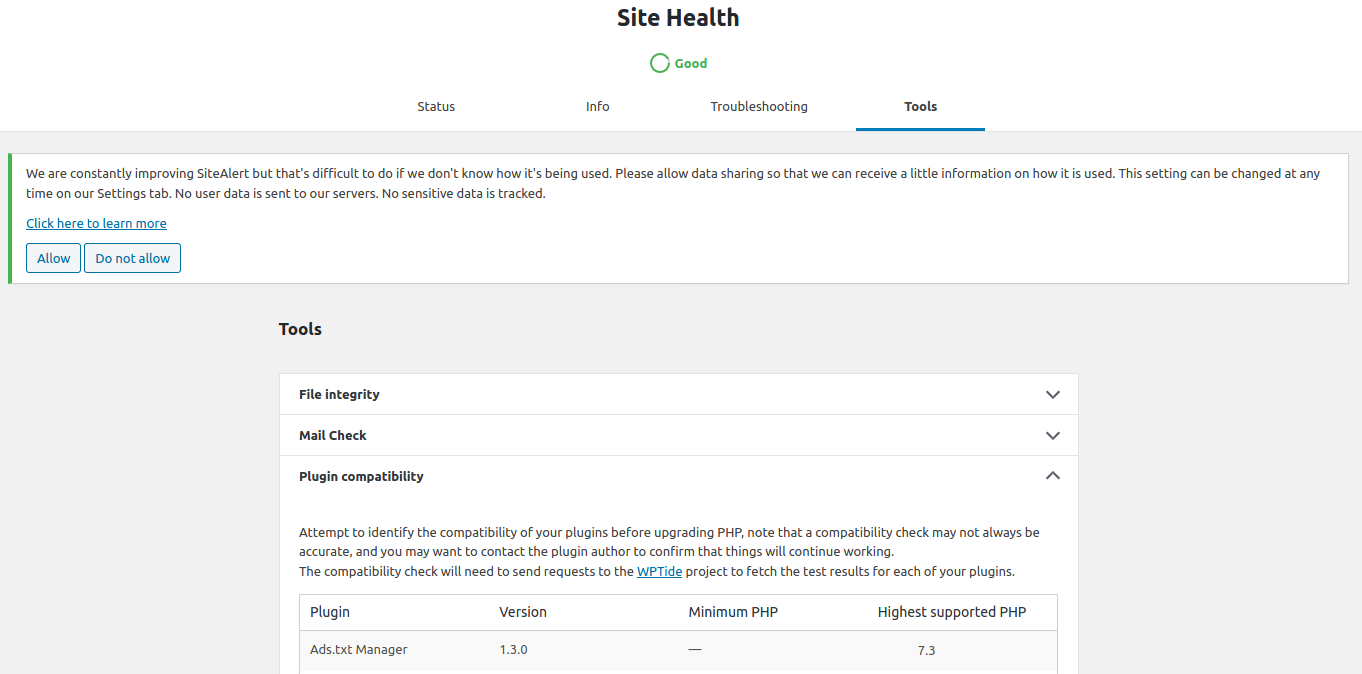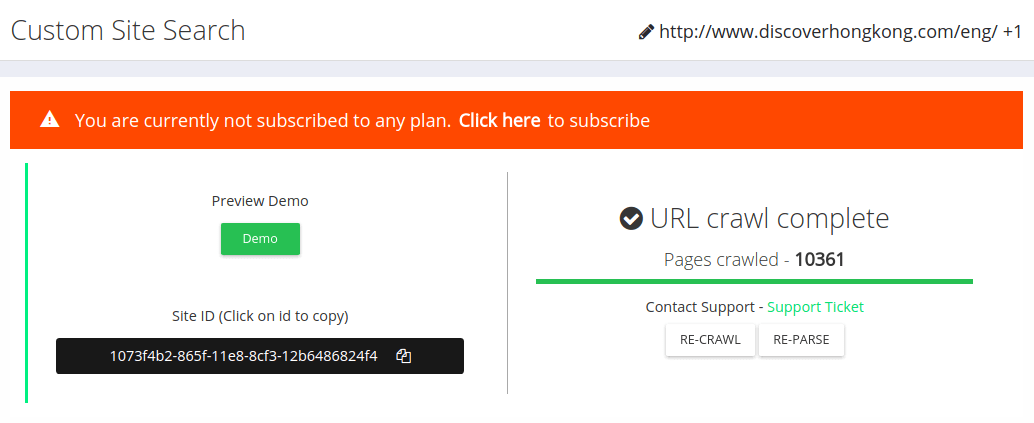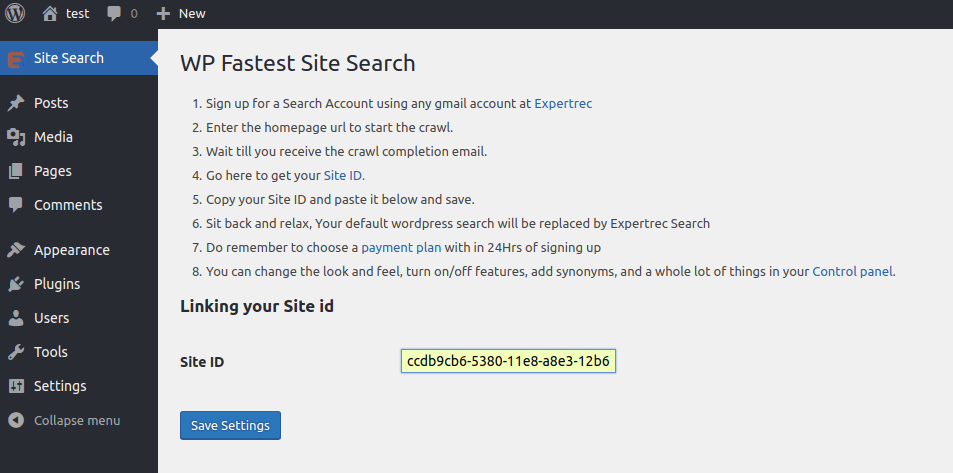11/When your WordPress search widget is not working and you are looking for how to fix it, We are suggesting some of the steps that we follow to fix the WordPress search-related problems. Hope that helps in solving yours. Since the default WordPress search is not a great search that matches the quality of Google Search, it is recommended to add WP fastest site search plugin for your site search needs. Especially if your website has lots of pages or it has lots of products.

Fix your wordpress search widget
Step 1- Take a backup
When you make changes to your WordPress site, there is a slight probability that you can break your site. It is recommended to take backup using a Backup guard before you begin making changes.
Step 2- Check your site health
In your WordPress admin panel, go to tools -> site health and check the status of your site health. Make sure that you perform the recommendations provided by the default WordPress site health tool.

Step 3- Check for plugin incompatibilities
You can uninstall plugins one by one and check if the search issue goes off. This could be the solution for 50% of all WordPress search widgets, not working issues. You can use the plugin detective WordPress plugin to do this as well.
Step 4- Check for cache issue
If you are using any caching plugin for improving WordPress speed, make sure you clear the site cache. If you are not sure to do this, you can use the “clear cache for me” WordPress plugin that works with most of the well-known WordPress speed plugins mentioned below.
- Autoptimize
- Breeze Cache
- Cache Enabler
- GoDaddy Cache
- Kinsta Cache
- LiteSpeed Cache
- SiteGround SuperCacher
- WP Fastest Cache
- WP Super Cache
- WP Optimize Cache
- W3 Total Cache
- WPEngine Cache
Step 6- Check your Theme / Layout, Make sure your Widget Area is Enabled
Disable all plugins, and use one of the defaults (Twenty*) themes. If the problem goes away, enable them one by one to identify the source of your troubles.
The widget would work automatically once it’s added to a widget area, it’s nice to set a title for the widget with some text. This can be set in Dashboard -> Appearance -> Widgets. Make sure that the widgets area is enabled on the desired page, from the theme options (Dashboard -> Appearance -> Customize -> Layout).
It’s quite possible you might be using a Full-Width template on the website, and the sidebar would be disabled. Try picking a default template it should work.
Step 5- Replace your WordPress search widget
If all the other methods didn’t work, you can replace your search widget with the WP fastest site search plugin that replaces your WordPress search widget with a brand new search widget that looks similar to the image below.

.
Steps to install replace your WordPress search widget
- Install WP fastest site search plugin from WordPress plugin store.
- Go to https://cse.expertrec.com/newuser?platform=wordpress.
- Enter your WordPress website URL and click on next->
- The crawl will start in the background.

Add expertrec custom search and start the crawling - Login to your WordPress admin panel.
- In your left panel you must be able to see expertrec’s WordPress plugin, click on that.
- Get your site ID (or) API key from your expertrec control panel ( here ).

How to add the site ID obtained from ExpertRec dashboard to WP Fastest Site Search Plugin - Copy paste your site id in your WordPress control panel and click on save changes.
- Make sure you have upgraded to a paid plan before 15 days of free trial. (Price begins at 9 USD per month)
- That’s it! Your brand new WordPress search is up and running! Here are snapshots of the search form and the search results pages.
- If the plugin method didn’t work, you can add the code from https://cse.expertrec.com/csedashboard/home/code and add it to your WordPress PHP code. Please note that you have to add separately the code <ci-search></ci-search> to a place where you want the search box to appear ( Tip!- Contact our support team to get this done). There might be a one-time fee for integration.
HOW WORDPRESS SEARCH WORK?
WordPress, a popular content management system (CMS), offers a built-in search functionality that allows users to quickly find content on their websites. Understanding how WordPress search works can help website owners optimize their content for better discoverability and user experience.
Indexing Content: When you publish or update a post, page, or custom post type on your WordPress site, the content is automatically indexed by the search engine. This indexing process involves parsing the content and storing it in a way that makes it searchable.
MySQL Database: WordPress uses a MySQL database to store all of its content, including posts, pages, comments, and metadata. When a user performs a search query, WordPress queries the database to retrieve relevant content based on the search terms.
Keyword Matching: WordPress search operates primarily on keyword matching. When a user enters a search query, WordPress compares the search terms with the content of each post or page in the database. Posts containing the search terms are returned as search results.
Relevance: WordPress search also considers the relevance of content to the search query. It uses a ranking algorithm to determine the most relevant results based on factors such as keyword density, title matches, content freshness, and other criteria.
Search Filters: WordPress provides search filters to help users refine their search results. Users can filter results by categories, tags, post types, and publication dates to narrow down their search and find the most relevant content.
Performance Optimization: Optimizing WordPress search performance is essential for ensuring fast and efficient search results. Website owners can improve search performance by optimizing database queries, caching search results, and using search plugins that offer advanced search features.
Customization: WordPress search functionality can be customized to suit the specific needs of a website. Developers can extend WordPress search capabilities by creating custom search templates, implementing custom search algorithms, or integrating third-party search solutions.
Search Plugins: WordPress offers a wide range of search plugins that enhance the default search functionality. These plugins provide features such as faceted search, autocomplete suggestions, advanced filtering, and integration with external search engines like Elasticsearch.
SEO Considerations: Optimizing content for WordPress search also involves considering search engine optimization (SEO) factors. This includes using relevant keywords in titles, headings, and content, optimizing meta tags, and structuring content in a way that is easy for search engines to crawl and index.
5 Common Examples of WordPress Search Not Working
1. WordPress Search Box Doesn’t Appear:
This issue typically occurs when the search form markup is missing or incorrectly implemented in the WordPress theme template files.
Solutions:
Ensure that the searchform.php template file is present in the theme directory and contains the necessary HTML markup for the search form.
Verify that the search form is correctly included in the header, sidebar, or footer of the website layout.
2. WordPress Search Doesn’t Give Relevant Results:
Sometimes, the default WordPress search algorithm may not provide relevant results, especially if the content is poorly optimized or if the search query is ambiguous.
Solutions:
Install and configure a search plugin that offers advanced search features and better relevance algorithms.
Optimize website content for search by using relevant keywords, descriptive titles, and structured content.
3. WordPress Search Is Slow:
Slow search performance can occur due to a variety of factors, including large databases, inefficient queries, or insufficient server resources.
Solutions:
Optimize WordPress database performance by cleaning up unnecessary data, optimizing database tables, and implementing caching mechanisms.
Upgrade hosting resources to a higher-tier plan with more server resources and better performance.
4. WordPress Search Shows a 404 Error:
This error occurs when WordPress is unable to find the search results page or encounters a problem with the search query.
Solutions:
Check the permalink settings in the WordPress dashboard to ensure that the search results page is correctly configured.
Verify that the search.php template file exists in the theme directory and contains the necessary code to display search results.
5. WordPress Search Results Are Inconsistent or Unreliable:
In some cases, WordPress search may return inconsistent or unreliable results, especially if the content is not properly indexed or if there are conflicts with other plugins or themes.
Solutions:
Rebuild the search index by using a plugin or manually clearing and rebuilding the WordPress search cache.
Disable conflicting plugins or themes that may be interfering with the search functionality and test the search again for consistency.
How to Fix Slow WordPress Search
Is your WordPress site suffering from slow search performance, causing frustration for visitors trying to find content? Fortunately, there are several steps you can take to optimize WordPress search and improve its speed. Additionally, integrating third-party solutions like ExpertRec can provide lightning-fast search results, enhancing user experience significantly.
1. Optimize WordPress Database:
- Start by optimizing your WordPress database to improve search performance. Use plugins like WP-Optimize or WP-Sweep to clean up unnecessary data, optimize database tables, and remove database overhead.
2. Implement Caching:
- Utilize caching mechanisms to speed up WordPress search. Install a caching plugin like WP Super Cache or W3 Total Cache to cache search results and reduce the load on your server.
3. Upgrade Hosting Resources:
- Consider upgrading your hosting plan to one that offers more server resources, such as increased CPU and memory allocation. A dedicated or VPS hosting environment can significantly improve search performance.
4. Use a Content Delivery Network (CDN):
- Implement a CDN to distribute search requests across multiple servers and reduce latency. This helps deliver search results faster to users located in different geographic regions.
5. Optimize Search Queries:
- Optimize WordPress search queries to reduce the load on the database and improve search speed. Use plugins like Query Monitor to identify slow queries and optimize them for better performance.
6. Consider ExpertRec Integration:
- ExpertRec is a powerful search solution that can significantly improve WordPress search performance. It uses advanced algorithms and caching mechanisms to deliver search results in milliseconds, enhancing user experience.
- Integrating ExpertRec with your WordPress site is easy and straightforward. Simply sign up for an account, configure the search settings according to your preferences, and add the provided code snippet to your website.
- ExpertRec offers customizable search features, including autocomplete suggestions, faceted search, and typo tolerance, providing users with a seamless search experience.
- With ExpertRec, you can ensure that your WordPress site delivers lightning-fast search results, improving user satisfaction and engagement.
7. Monitor and Test Regularly:
- Continuously monitor your WordPress site’s search performance and conduct regular tests to identify any issues or bottlenecks. Use tools like Google PageSpeed Insights or GTmetrix to measure search performance and identify areas for improvement.
By following these steps and integrating ExpertRec with your WordPress site, you can fix slow search performance and provide users with a fast and efficient search experience.
FAQS
How Do I Customize the Search Bar in WordPress?
Customization and adding a search bar in WordPress is easy as it comes with a search option as a widget. Additionally, you will get lots of plugins which will assist you in adding a search panel or creating your own. There are three methods by which you can add or customize a search bar on your own. The first and easiest way to perform the job would be from the widget panel. Open the WordPress widgets and follow the steps mentioned below:
- Head on to your Admin Dashboard and go to Appearance and then Widgets.
- You will see the widget named “Search”, in the “Available Widgets”, click on it and follow by hitting the button Add Widget. You can also drag it to the Widget Area and add a customized title for your search widget.
- Go back to your site; the search widget will be visible on the sidebar.
For this, you won’t require coding knowledge as it is primarily an automated method.
The following method would be to go to the plugins and click on “Add New”. Follow up by searching for a plugin that adds the search bar. Install the plugin and activate it. Go to the settings and then to “Add Search To Menu”, and you are all set to configure the plugin.
You can also manually add a search box if you have some technical knowledge. By this, you can take complete control of styling and customization.
Is Elementor Search Form Widget Free?
Yes, the elementor Search Form Widget is Free; however, it also comes with various subscription plans.
How Do I Create & Edit the Search Results Page in Elementor?
Every WordPress website comes with a search result page per the theme used by the associate website. If you do not find the layout appealing, you can edit or create it independently. Suppose you lack PHP skills; you can take the help of elementor to build a custom search result page. You can create a custom header, footer, 404 page and any other themes you want through drag and drop. For this, you need to upgrade the elementor to the pro version. Follow the steps below to create or edit search results:
- Go to the “Templates” option, then move on to “Theme Builder” on your Wordpress “Dashboard” and open the screen. You will see a plus icon on the Search Result label on the left panel.
- Once in the template library, you can select a ready-made search result page layout. But if you want to create or edit it, close the window.
- First, you need to place the heading that would display the description of the search result page. To add a new section, click on the plus button. Once you have added the area, drag the “Heading” widget to it.
- Go to the left panel to set things such as text colour and typography. You will see a Content tab under the Title block; click the database icon and select the “Archive Title” option. You can also set the background as per your choice by clicking on the section handle to switch to edit mode.
If you want to add a new section, click the plus button and repeat the process. Once it’s edited, drag the search form widget. Move on to the settings panel to make the settings. You can set the icon size, placeholder, and many more on the search forum under the content tab. Once you are done editing, click on the upgrade button to finish your process.
Why is Elementor search not the best search and why should you be using Expertrec?
Elementor is primarily a page developer for WordPress and its search plugin allows users to navigate throughout the website. You are required to drag the search form widget where you want your search box to appear on the page. However, there are some major problems that you may face while using the Elementor search form, let’s have a look at them :
- WordPress offers a great platform to bloggers, however, its default search engine may fall short and not provide desired results. The main reason behind not getting the results according to search queries is that WordPress search sorts results by date of publication and not relevance. It also doesn’t look for misspelt queries and doesn’t take into consideration various important data while running a search query.
- Plugin conflict may arise as there are multiple WordPress plugins and Elementor is not compatible with all of them. Due to incompatibility, Elementor may not function properly.
- It might be a rare case scenario but there still lies a possibility of the hosting limitations causing problems with the search. Elementor requires some systems that would ensure the smooth working of the plugin but if the host doesn’t fulfil these requirements, the chances of Elementor experiencing problems arise.
- Often due to using the outdated version of Elementor the plugin doesn’t work properly due to a lack of compatibility with WordPress and this may lead to not getting desired results.
Why is Expertrec a better alternative?
Expertrec is known to be one of the best WordPress internal search plugins that offer great help to users to look for and get desired results of their search queries. It has various features and is easy to use. It helps to enhance the overall customer experience.
- When many search plugins may not give you the results that you are looking for, Expertrec works efficiently and makes use of various features like auto-complete, autocorrect, and spell-check to give relevant results.
- Expertrec can work with more than three languages and it offers a wide range of features such as unlimited search.
- Expertrec offers customized search, and personalization as well. Expertrec also offers voice search which is a game changer in recent days and is extremely helpful to the users.
- Expertrec doesn’t provide zero results to any search query as it has the “did you mean” feature. It also shows alternatives, predicts search queries, shows products that the user may like and also recommends products based on the preferences and interests of the customers.
Expertrec, owing to its wide range of features and benefits is no doubt a better alternative than Elementor, and it doesn’t face any errors and runs smoothly. It provides faster results that can in turn help your WordPress website to gain more users because customer experience decides the sales of any e-commerce site. Search is the most essential part of the website and the Expertrec search plugin is the best option available to you.
Mention about elementor search plugin
Elementor is a popular drag-and-drop page builder plugin for WordPress. It allows users to create custom designs for their website without the need for coding knowledge.
Elementor also offers a search widget that can be added to your website using its Pro version. This widget allows visitors to search your site for specific content, including pages, posts, and custom post types.
However, Elementor does not offer its own search plugin. If you’re looking for more advanced search functionality for your website, you may want to consider using a dedicated search plugin like Relevanssi or SearchWP. These plugins integrate with Elementor and offer features such as autocomplete suggestions, fuzzy matching, and advanced filtering options to enhance the search experience for your visitors.






